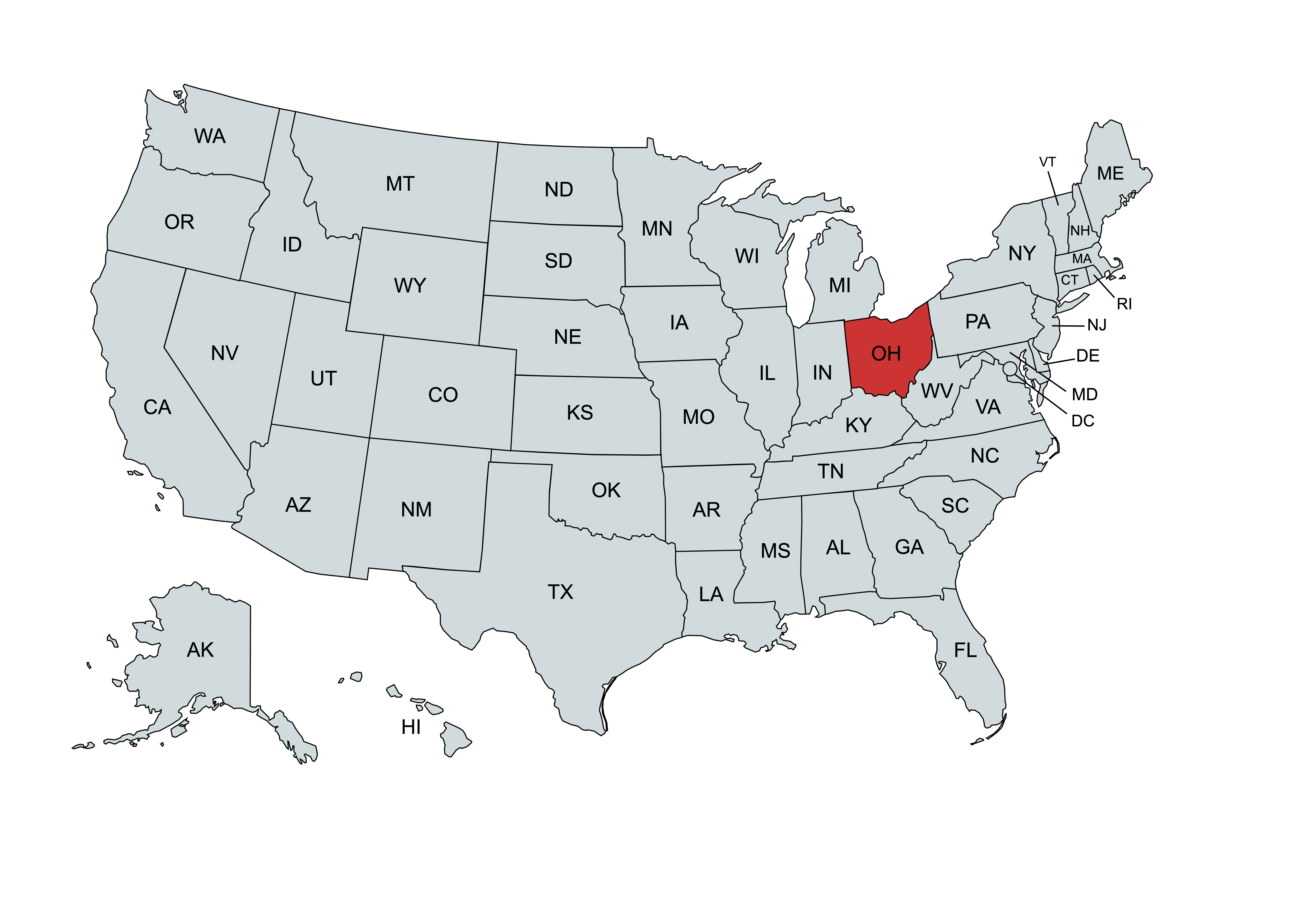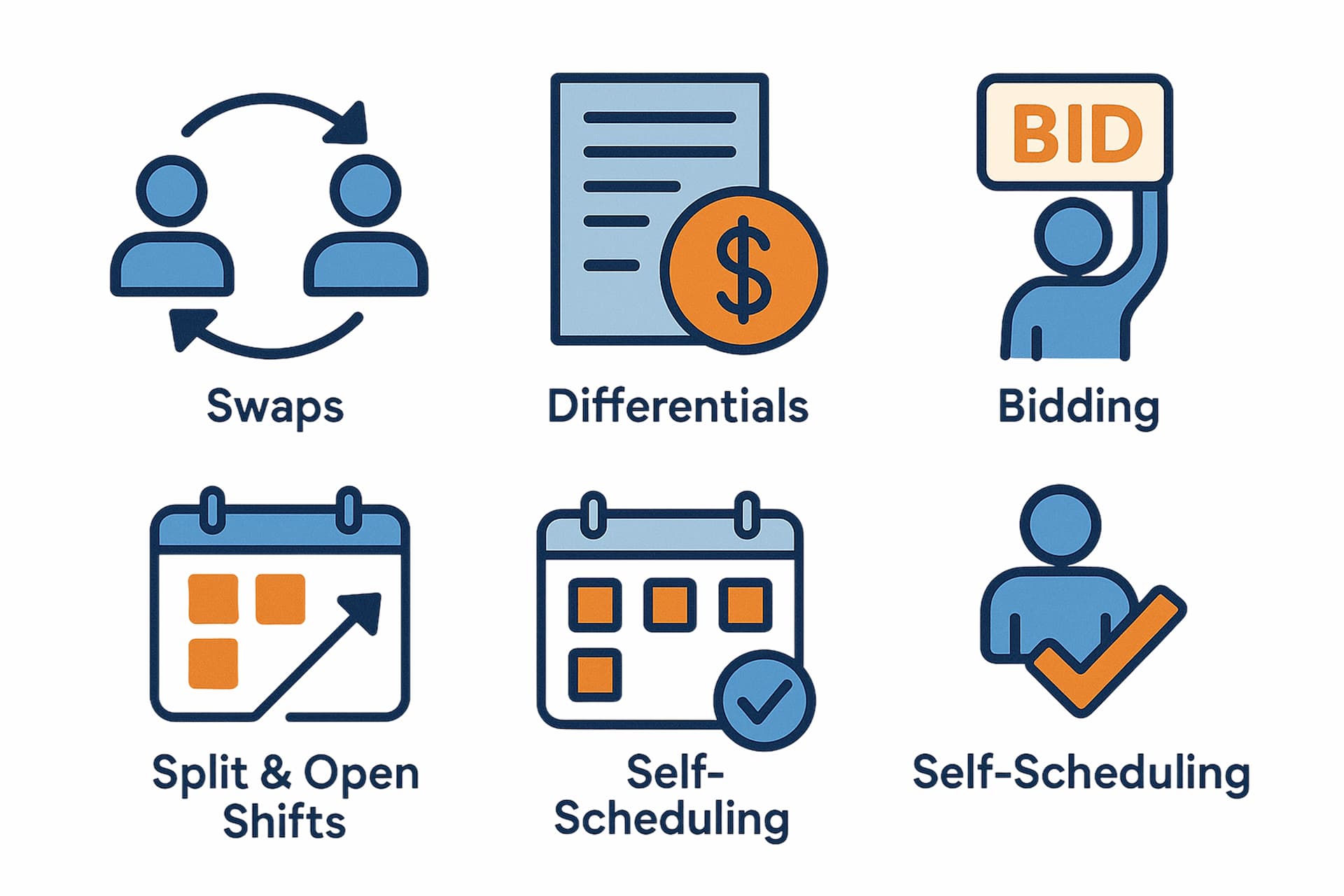Minimum Wage
Ohio adjusts its minimum wage annually based on inflation. As of January 1, 2025, most employers must pay $10.70 per hour.
State minimum wage: $10.70 per hour for non-tipped employees at businesses with annual gross receipts over $385,000.
Small employers: Employers with gross receipts under $385,000 annually must pay the federal minimum wage of $7.25/hour.
Young workers: Employees under 16 may be paid the federal minimum wage regardless of employer size.
Annual adjustment: Ohio updates the rate every January 1 based on the Consumer Price Index (CPI). The rate increases when inflation occurs but never decreases.
Local laws: No city or county in Ohio currently enforces a higher local minimum wage above the state rate.
Posting requirements: Employers must display the current Ohio minimum wage poster in a conspicuous location accessible to all employees.
Recordkeeping: Employers must maintain accurate wage and hour records for at least 3 years.
Tipped Minimum Wage
Ohio allows a reduced tipped cash wage if tips make up the difference to reach the full minimum wage.
Tipped minimum wage: $5.35 per hour for employees who regularly receive more than $30 per month in tips (as of January 1, 2025).
Tip credit calculation: Employers may take a tip credit of up to $5.35/hour (the difference between $10.70 and $5.35).
Make-up requirement: If tips plus base wage do not reach $10.70/hour, employers must pay the difference. This is calculated weekly, not per shift.
Tip ownership: All tips belong to employees. Employers cannot retain any portion of tips or use them for business expenses.
Tip pooling: Allowed among customarily tipped employees (servers, bartenders, bussers). Managers and supervisors cannot participate in tip pools.
Notice requirement: Employers must inform tipped employees about the tip credit provisions and their rights under Ohio law.
Overtime Laws
Ohio follows the federal Fair Labor Standards Act (FLSA) for overtime requirements.
Overtime rate: 1.5× regular pay rate for all hours worked over 40 in a workweek for non-exempt employees.
Workweek definition: A fixed, regularly recurring period of 168 hours (7 consecutive 24-hour periods). Employers may define when the workweek begins.
No daily overtime: Ohio does not require daily overtime pay. Only weekly totals over 40 hours trigger overtime, regardless of hours worked in a single day.
Exempt classifications: Executive, administrative, professional, outside sales, and certain computer employees may be exempt if they meet both salary and duties tests.
Salary threshold: As of July 1, 2024, exempt employees must earn at least $844/week ($43,888 annually). Some highly compensated employees have higher thresholds.
Payment timing: All overtime wages must be paid on the next regular payday following the pay period in which they were earned.
Recordkeeping: Employers must keep accurate records of hours worked and wages paid for at least 3 years, including daily and weekly totals.
Meal and Rest Breaks
Ohio requires meal breaks only for minors under 18. Adult break requirements follow federal guidance.
Adults (18+): Ohio does not mandate meal or rest breaks for adult employees. Break policies are determined by the employer.
Short breaks: If an employer provides short breaks (typically 5-20 minutes), federal law requires these be paid.
Meal periods: If an employer provides meal breaks of 30+ minutes where employees are completely relieved of duties, these may be unpaid.
Minors under 18: Must receive a 30-minute uninterrupted meal break if working more than 5 consecutive hours.
Break timing for minors: The 30-minute break should occur after the first hour of work and before the last hour.
Nursing mothers: Federal law requires reasonable break time and a private space (not a bathroom) for expressing breast milk for up to one year after childbirth.
Recordkeeping: Employers must maintain records of break times provided to minors for at least 2 years.
Leave and Holidays
Ohio does not mandate paid vacation, paid sick leave, or paid holidays for private employers.
Vacation leave: Not required by state law. If offered, employers must follow their written policies regarding accrual, use, and payout at termination.
Sick leave: No statewide paid sick leave requirement for private employers. Public employers may have different requirements.
Holiday pay: No requirement to provide paid or unpaid holiday leave. Premium pay for holiday work is not required unless it results in overtime.
Family and Medical Leave Act (FMLA): Eligible employees (worked 1,250+ hours in 12 months at companies with 50+ employees) may take up to 12 weeks unpaid, job-protected leave annually for qualifying reasons.
Military leave: Ohio Veterans and Military Leave Law provides up to 31 days per year of unpaid leave for military service or training.
Jury duty: Employers cannot discharge, threaten, or coerce employees for jury service. No pay is required but employers may not penalize employees.
Voting leave: Employers must provide reasonable time off to vote if employees don't have sufficient time outside working hours. Pay is not required.
Bone marrow/organ donation: Ohio law does not require specific leave, but FMLA may cover recovery time.
Child Labor Laws
Ohio strictly regulates employment of minors ages 14-17 through work permits, hour restrictions, and prohibited occupations.
Work permits required: All minors ages 14-17 must obtain an age and schooling certificate (work permit) before beginning employment. Issued by school superintendents.
Break requirement: Minors must receive a 30-minute uninterrupted meal break if working more than 5 consecutive hours.
Ages 14-15 restrictions:
- No work before 7 AM or after 7 PM during school year (9 PM June 1 through Labor Day)
- Maximum 3 hours per day on school days
- Maximum 8 hours per day on non-school days
- Maximum 18 hours per week during school weeks
- Maximum 40 hours per week when school is not in session
Ages 16-17 restrictions:
- No work before 6 AM when not enrolled in school
- Cannot work before 7 AM when school is in session
- Cannot work past 11 PM Sunday-Thursday before a school day (no restriction Friday-Saturday)
- No maximum daily or weekly hours (but overtime rules apply)
Prohibited occupations (all minors under 18): Manufacturing, mining, logging, power-driven machinery (including slicers, mixers, dough rollers), roofing, excavation, demolition, meat processing, hazardous chemicals, and more.
Specific prohibitions for 14-15: Cooking (except electric or gas grills), baking, warehouse work (except office/clerical), ladder/scaffold work, motor vehicles, and door-to-door sales (unless registered with DOC).
Penalties: Employers violating child labor laws face fines up to $1,000 per violation per minor.
Pay & Wage Rules
Ohio regulates pay frequency, final paychecks, deductions, and wage record requirements.
Pay frequency: Employers must pay employees at least semi-monthly (twice per month) or every two weeks.
Final paycheck: Must be paid by the next regular payday or within 15 days of termination, whichever comes first. No special timing based on voluntary vs. involuntary separation.
Vacation payout: Ohio law does not require payout of accrued vacation at termination unless the employer's policy specifically provides for it.
Pay statements: Employers must provide itemized statements showing gross wages, deductions, and net pay. Electronic statements are acceptable if employees have access.
Allowed deductions: Only taxes, court-ordered garnishments, employee-authorized deductions (insurance, retirement), and wage advances repayment.
Prohibited deductions: Cannot deduct for cash shortages, breakage, uniforms, or equipment without specific written authorization that doesn't reduce wages below minimum wage.
Wage garnishment limits: Maximum 25% of disposable earnings or amount exceeding 30× federal minimum wage per week, whichever is less.
Recordkeeping requirements: Employers must maintain payroll records for at least 3 years, including employee information, hours worked, wages paid, and deductions.
Hiring and Firing
Ohio is an at-will employment state with important protections against discrimination and retaliation.
At-will employment: Either party may terminate employment at any time for any lawful reason or no reason, unless modified by contract or collective bargaining agreement.
Hiring protections: Ohio Civil Rights Act prohibits discrimination based on race, color, religion, sex, national origin, disability, age (40+), ancestry, or military status.
Background checks: Must comply with Fair Credit Reporting Act (FCRA). Cannot ask about arrest records (only convictions). Must provide disclosure and obtain consent.
Criminal history: Cannot inquire about sealed or expunged convictions. Some limitations on using older convictions in hiring decisions.
Credit checks: Ohio law does not restrict employment-related credit checks, but FCRA rules apply if used.
Wrongful termination: Termination is illegal if based on protected characteristics, in retaliation for protected activity, or in violation of public policy.
Protected activities: Filing workers' comp claims, reporting safety violations, whistleblowing, serving on jury duty, military service, or engaging in union activities.
Mass layoffs: Federal WARN Act requires 60 days notice for mass layoffs (50+ employees at single site) or plant closures.
Documentation: Employers should maintain consistent policies, document performance issues, and apply rules uniformly to reduce wrongful termination claims.
Workers' Compensation
Ohio operates a state-run workers' compensation system through the Bureau of Workers' Compensation (BWC).
Required coverage: All Ohio employers with one or more employees must carry workers' compensation insurance through BWC or become certified self-insured.
State-fund vs. self-insured: Most employers pay premiums to BWC (state-fund). Large employers (typically 50+ employees) may apply to self-insure.
Benefits include: Medical care, temporary total disability (TTD), permanent partial disability (PPD), permanent total disability (PTD), rehabilitation services, and survivor benefits.
Compensation rates (2025): TTD pays 72% of full weekly wage for first 12 weeks, then 66.67% of average weekly wage. Maximum weekly rate: $1,231.
Reporting requirements: Employees must report injuries within 1 year. Employers must file First Report of Injury (FROI-1) within one week of notification.
Medical provider choice: Injured employees have the right to choose their own BWC-certified medical provider for treatment.
Industrial Commission: Handles disputes, appeals, and hearings related to workers' compensation claims separate from BWC.
No retaliation: Employers cannot terminate or retaliate against employees for filing legitimate workers' compensation claims.
Premiums and rates: Ohio has the 5th lowest workers' comp rates in the nation as of 2024. Rates are experience-rated based on employer safety record.
Unemployment Insurance
Ohio unemployment insurance is administered by the Ohio Department of Job and Family Services (ODJFS).
Administering agency: Ohio Department of Job and Family Services (ODJFS) manages the unemployment compensation system.
Employer requirements: Register within 30 days of hiring first employee, file quarterly wage reports, pay unemployment taxes, maintain records for 4+ years.
Employee eligibility requirements:
- Worked at least 20 weeks during base period
- Earned average of at least $338 per week during base period (2025 requirement)
- Unemployed through no fault of your own (not fired for just cause or quit without good cause)
- Able, available, and actively seeking work
Base period: First four of the five most recently completed calendar quarters before filing claim.
Benefit amounts (2025): 50% of average weekly wage during base period, up to maximum of $600/week. Higher amounts available if you have dependents.
Benefit duration: Typically up to 26 weeks. May be extended during high unemployment periods through federal programs.
Work search requirement: Must engage in good faith job search, contacting at least two potential employers each week and documenting activities.
Filing options: Claims can be filed online at unemployment.ohio.gov or by phone. Weekly claims must be filed to continue receiving benefits.
Appeals: If denied, employees have 21 days to appeal to Unemployment Compensation Review Commission (UCRC).
Workplace Rights & Safety
Ohio protects employees through anti-discrimination laws, workplace safety regulations, and whistleblower protections.
Ohio Civil Rights Act: Prohibits discrimination in employment based on race, color, religion, sex, national origin, disability, age (40+), ancestry, or military status.
Protected employers: Law applies to employers with 4 or more employees. Federal laws (Title VII, ADA, ADEA) apply to larger employers.
Sexual harassment: Considered unlawful sex discrimination. Includes quid pro quo and hostile work environment harassment.
Filing discrimination complaints: File with Ohio Civil Rights Commission within 6 months (extended to 2 years for employment cases as of 2019).
Federal complaints: Can file with Equal Employment Opportunity Commission (EEOC) within 300 days. Dual filing with both agencies is common.
Workplace safety (Private employers): Covered by federal OSHA. Employers must provide safe workplace, maintain injury logs, report serious incidents, and allow OSHA inspections.
Public sector safety: State and local government employers follow Ohio Bureau of Workers' Compensation safety standards.
Whistleblower protection: Employees cannot be retaliated against for reporting violations of law, health/safety hazards, or employer wrongdoing.
Right to organize: Private sector employees protected by National Labor Relations Act. Public employees protected by Ohio Public Employees Collective Bargaining Law.
Accommodations: Employers must provide reasonable accommodations for disabilities and religious practices unless it causes undue hardship.
Official Resources
- Ohio Department of Commerce - Division of Industrial Compliance
- Ohio Civil Rights Commission (OCRC)
- Ohio Bureau of Workers' Compensation (BWC)
- Industrial Commission of Ohio
- Ohio Department of Job and Family Services - Unemployment
- U.S. Department of Labor - Wage and Hour Division
- U.S. Equal Employment Opportunity Commission



